The third hexagram in the Yijing is "Sprouting" or "Gathering Support", the image of a little green sprout poking through the snow, promising renewal. Walking the snowy garden, sweet little hexagram 3 is everywhere.
Somewhere, on a distant mountain in the outback of China, my next year's tea is growing.
Somewhere, on a distant mountain in the outback of China, my next year's tea is growing.
I wrote recently of a Jingmai brick produced by Mingxiangyayuan - this is its elder brother from the previous year, released under the Hailanghao brand. I suppose that one could reach Jingmai travelling south from Xiaguan to Menghai (and look forward to trying this out for myself at some point).
Somewhat optimistically, the vendor description (Yunnan Sourcing) describes this as being 70% wild arbor tea, 30% plantation tea. Given the relatively low cost of this cake, and the fact that any cake being 70% wild arbor would be highly unusual, that just cannot be correct. To be frank, I'm a little surprised to be reading such claims. Keep it believable, vendors!
More credible is the note that the owner of Mingxianyayuan purchased this maocha at a late date, when the price had fallen considerably, following the bursting of the pu'er bubble. Buying one's own maocha seems like a very cost-effective way of getting good tea...
Somewhat optimistically, the vendor description (Yunnan Sourcing) describes this as being 70% wild arbor tea, 30% plantation tea. Given the relatively low cost of this cake, and the fact that any cake being 70% wild arbor would be highly unusual, that just cannot be correct. To be frank, I'm a little surprised to be reading such claims. Keep it believable, vendors!
More credible is the note that the owner of Mingxianyayuan purchased this maocha at a late date, when the price had fallen considerably, following the bursting of the pu'er bubble. Buying one's own maocha seems like a very cost-effective way of getting good tea...
Fragmented leaves aplenty makes examination a touch tricky. However, the aroma is exceedingly fresh, and pungently sweet. Correspondingly, the aroma cup is filled with similarly sweet and rich scents.
Sometimes, this produces yellow soup (pictured below), sometimes orange. It's a bit of a shapeshifter.
Some sessions, I like this tea very much; some sessions, I am underwhelmed. I come out underwhelmed more often than not. What do you do when you find a tea that doesn't thrill you all the time? For me, the answer is to pass - shelf space and tea finances are limited resources!
Some sessions, I like this tea very much; some sessions, I am underwhelmed. I come out underwhelmed more often than not. What do you do when you find a tea that doesn't thrill you all the time? For me, the answer is to pass - shelf space and tea finances are limited resources!
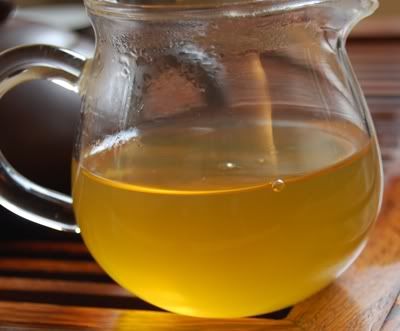
It has the savoury flavour of Jingmai leaves, with a fine, sweet finish. However, in this particular Jingmai tea, the savoury character flips over into the deep sweetness that I associate with throat lozenges - the little sweets one takes for a cough. This becomes more sour as the infusions progress, and puts me off. Sourness is never a good sign!
I notice in the year since I bought it, the price has climbed from $28 to $39, which is quite an increment. That makes it entirely overpriced, in my opinion. I purchased this as I enjoyed its brother, the 2007 Bulang, so very much, which is perhaps more worthy of attention.
I notice in the year since I bought it, the price has climbed from $28 to $39, which is quite an increment. That makes it entirely overpriced, in my opinion. I purchased this as I enjoyed its brother, the 2007 Bulang, so very much, which is perhaps more worthy of attention.
For every green shoot poking forth through the snow in accordance with hexagram #3, there is always a cat waiting to bite its head off...

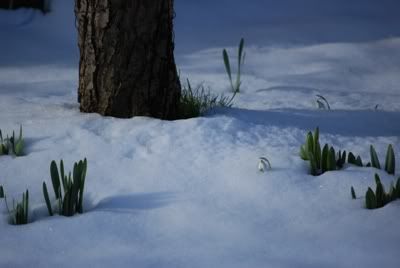
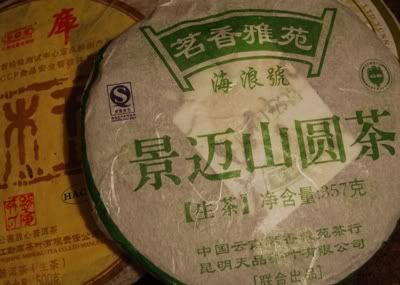
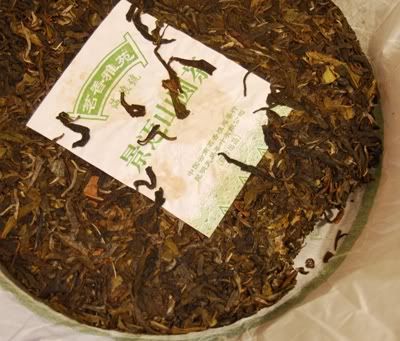
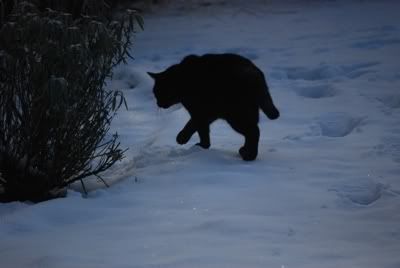
4 comments:
Hobbes, the broth seems quite cloudy. I can almost taste the chunky sweet tea. I don't own that tea and haven't tried.
Good to read the review. Also insightful comment about the vendor description and the price increase.
I sometimes wonder if the vendors ever feel bad about the price they charge. I guess not, huh?
Thanks again as usual.
Dear Woogie,
It's just a business, so I don't suppose we should ascribe any forms of (im)morality to prices. Let 'em charge what they like, and hope that market forces rectify the situation.
I used to feel very bad about tea vendors exploiting Westerners, but now I just vote with my wallet. If they charge too much, I go elsewhere. That's the great thing about tea-drinking! Lots of vendors, and more every year...
Toodlepip,
Hobbes
The outdoor picture of Heidu in the is a nice departure. At least we now know that he actually does go outside for some activity. So far it seemed all he did was lounge around in you tea area / China Post simulator and communicate the wrath of the puerh Gods ;)!
He does sleep an extraordinary amount, you know. :)
Toodlepip,
Hobbes
Post a Comment